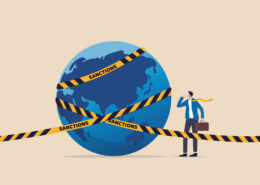Syndicates of Terror
Mitigating Increased Risks Linked to Latin American Cartels
📅 April 3, 2025
📅 April 3, 2025
The recent designation of several Latin American drug cartels as foreign terrorist organizations (FTOs) and Specially Designated Global Terrorists (SDGTs) by the United States brings new compliance challenges for financial institutions and other companies that transact with business partners and clients in the region. The designations mean that foreign financial institutions face the risk of secondary sanctions if they’re found to conduct significant transactions with designated terrorists, and U.S. entities can face criminal prosecution for knowingly providing “material support” to an FTO. Economic sectors previously considered lower risk for illicit activities may expose financial institutions and other firms to direct or indirect transactions with newly designated terrorist groups.
Cartels such as Sinaloa and the Cartel Jalisco New Generation (CJNG)—which were designated under the terrorism authorities—control certain geographic areas and ports in Mexico and are involved in multiple markets in the region. CJNG has diversified its activities into various economic sectors, including real estate, grocery stores, and gas stations. The group also is involved in the synthetic drug trade, importing precursor chemicals, producing the synthetic drugs, and disguising them as legitimate pharmaceuticals. Other cartels are involved in sectors such as internet services and agriculture.
Stakeholders in restaurant and food import sectors are at risk of transacting with FTO-linked entities should they unwittingly import avocados or other agricultural products from cartel-linked growers. Four companies supply avocados from Mexico to major supermarket chains in the United States, such as Kroger, Costco, Whole Foods, and others, according to nonprofit organization Climate Rights International. This trade exposes U.S. financial institutions that provide financing for these transactions, as well as grocery stores and other entities in the supply chain to potential liabilities and reputational risk.
Cartels in Honduras, Venezuela, El Salvador, and other Latin American countries are also involved in economic sectors, such as mining and road construction, judging by OFAC’s 2013 designation of businesses linked to the Los Cachiros drug cartel.
The designation of these cartels as FTOs and SDGTs presents additional compliance challenges for financial institutions and other companies transacting in Latin America. Transacting with Mexican and other Latin American businesses in the agricultural, fuels, minerals, and other sectors that generally may appear to be low risk for fraud, money laundering, and other illicit activities, can now potentially expose financial institutions to criminal liability for providing “material support” to terrorist organizations, present secondary sanctions risks, and even subject them to lawsuits by victims of terrorist acts. Licit businesses in Mexico are particularly vulnerable to cartel penetration and could expose financial institutions to regulatory risk, as well as threaten foreign financial institutions’ access to the U.S. dollar.
Monitoring developments in Mexico that could provide insights into these cartels’ activities and involvement in licit sectors of the economy is key to mitigating the risk of penalties or reputational damage that stem from transacting with a designated FTO.
Reviewing risk assessments and adjusting risk ratings for jurisdictions and economic sectors known for cartel activities can also mitigate exposure to designated FTOs.
Additional due diligence on customers or business partners in countries with known cartel presence—especially newly designated FTOs—and knowing and understanding supply chains and customers can also help diminish the risk of transacting—even indirectly—with terrorist organizations.
List screening alone will not be sufficient to ensure that organizations with exposure to FTOs and geographies controlled by them are complying with U.S. sanctions. Adverse media reports detailing cartel involvement in Latin American economies to assess jurisdictional and economic sector risk can help update the risk of exposure. Further research into ownership and control structures of businesses in the agricultural, fuel, and other risky sectors in Latin America can also help mitigate vulnerabilities. The use of internal block or monitoring lists based on location and economic sector may help avoid transactions with cartel-linked businesses.
Canada in February listed seven of the eight cartels designated by the United States as terrorist organizations, strengthening the authority of law enforcement to investigate the financial transactions of the designated groups. Listing cartels as terrorist organizations bans financial transactions and dealing with property of the organizations for Canadians at home and abroad. The law could have implications for Canadian financial institutions, according to Toronto-based attorney Jeffrey Simser, who told Bloomberg News that financial institutions could theoretically be prosecuted for transacting with these newly designated terrorist organizations.










 AI vs. Human Judgment
AI vs. Human JudgmentThis site uses cookies. By continuing to browse the site, you are agreeing to our use of cookies.
Accept settingsHide notification onlySettingsWe may request cookies to be set on your device. We use cookies to let us know when you visit our websites, how you interact with us, to enrich your user experience, and to customize your relationship with our website.
Click on the different category headings to find out more. You can also change some of your preferences. Note that blocking some types of cookies may impact your experience on our websites and the services we are able to offer.
These cookies are strictly necessary to provide you with services available through our website and to use some of its features.
Because these cookies are strictly necessary to deliver the website, refusing them will have impact how our site functions. You always can block or delete cookies by changing your browser settings and force blocking all cookies on this website. But this will always prompt you to accept/refuse cookies when revisiting our site.
We fully respect if you want to refuse cookies but to avoid asking you again and again kindly allow us to store a cookie for that. You are free to opt out any time or opt in for other cookies to get a better experience. If you refuse cookies we will remove all set cookies in our domain.
We provide you with a list of stored cookies on your computer in our domain so you can check what we stored. Due to security reasons we are not able to show or modify cookies from other domains. You can check these in your browser security settings.
These cookies collect information that is used either in aggregate form to help us understand how our website is being used or how effective our marketing campaigns are, or to help us customize our website and application for you in order to enhance your experience.
If you do not want that we track your visit to our site you can disable tracking in your browser here:
We also use different external services like Google Webfonts, Google Maps, and external Video providers. Since these providers may collect personal data like your IP address we allow you to block them here. Please be aware that this might heavily reduce the functionality and appearance of our site. Changes will take effect once you reload the page.
Google Webfont Settings:
Google Map Settings:
Google reCaptcha Settings:
Vimeo and Youtube video embeds:
You can read about our cookies and privacy settings in detail on our Privacy Policy Page.
Privacy Policy